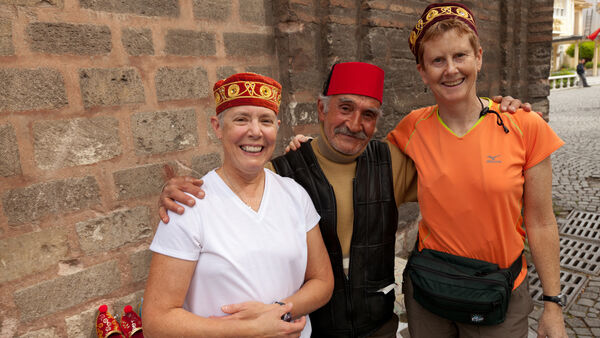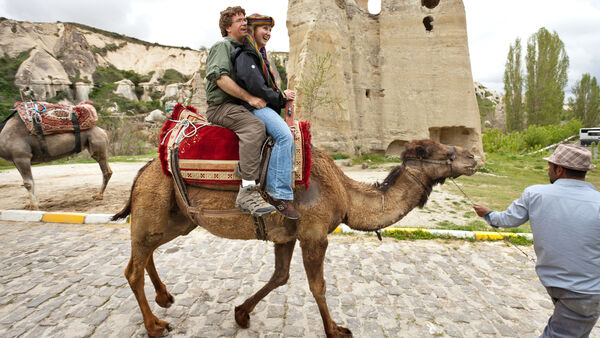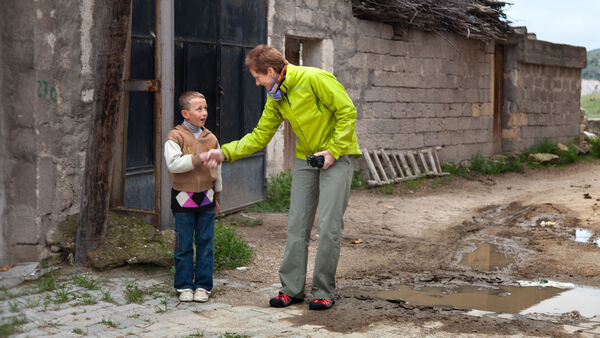Making the Most of Your European Trip



By Rick Steves
On the road, I get out of my comfort zone and meet people I'd never encounter at home. In Europe, I'm immersed in a place where people do things — and see things — differently. That's what distinguishes cultures, and it's what makes travel exhilarating. By being open to differences and staying flexible, I have a better time in Europe — and so will you. Be mentally braced for some surprises, good and bad. Much of the success of your trip will depend on the attitude you pack.
Expect problems and tackle them creatively. Travel is exciting and rewarding because it requires you to ad-lib, to be imaginative and spontaneous while conquering surprise challenges. Make an art out of taking the unexpected in stride. Relax — you're on the other side of the world playing games in a friend's backyard. Be a good sport, enjoy the uncertainty, and frolic in the pits. For many situations, the best defense is a good offense — arm yourself with good information and a knack for improvisation.
No trip is without its disappointments: If your must-see cathedral isn't covered with scaffolding, or your must-visit museum isn't closed for restoration, then your favorite artist's masterpiece will be out on loan--probably to the US.
Many of my readers' richest travel experiences have been the result of seemingly terrible mishaps: the lost passport in Slovenia, the doctor visit in Ireland, the blowout in Portugal, or the moped accident on Corfu.
Most of the time, the worst result is a missed museum or two, and maybe a blown budget for the week. But you may well make some friends and stack up some fond memories. This is the essence of travel that you'll enjoy long after your journal is shelved and your photos are archived.
Head off screwups before they happen. You make a rental-car reservation months ahead of time, have everything in careful order, go to pick up your car...and it's not there. The rental agency's fault? Sure. But if you'd called a day ahead to confirm, you'd have avoided an annoying hiccup in your travel plans. Double-checking things along the way minimizes the chances of having your trip marred by other people's mistakes.
Don't be a creative worrier. Some travelers actively cultivate pretrip anxiety, coming up with all kinds of reasons to be stressed. Every year there are strikes, train wrecks, political unrest...and yet millions of people travel to Europe every year and enjoy fun, richly rewarding trips. Don't sweat stuff that hasn't yet happened (and is very unlikely to happen) to you. And don't underestimate yourself — chances are, in the past you've managed to handle tougher problems than whatever your trip might throw at you.
Don't be penny wise, pound foolish. Smart travelers will spend a little extra to polish off the rough edges of a trip and maximize precious time. Faster trains can cost a bit more, but are worth taking if it means you're not arriving at the next town just as most sights are closing for the evening. A late-night taxi ride that gets you into bed a half-hour sooner than the night bus is a smart splurge, as is a mid-day taxi ride if it allows you to pack in one more memorable experience before dinner (and perhaps save your legs for walking the next day).
Be militantly humble — Attila had a lousy trip. Every summer — when Europe's at its hottest and most crowded — I watch tourists and locals clash. Sometimes it's the result of the tourist's mistake; sometimes it's the local's fault…and often it's a simple misunderstanding compounded by linguistic and cultural differences. Many tourists leave needlessly soured.
Don't let an unpleasant interaction ruin a travel day that's otherwise full of exciting new sights, sounds, and flavors. When I catch a Spanish merchant shortchanging me, I correct the bill, smile, and say em>"adiós." If a French hotel owner blows up at you for no legitimate reason, wait, smile, and try again. Assume it's a misunderstanding. With a focus on solving (instead of "winning") any dispute you may find yourself in, you'll be on your way faster — and with your good mood intact. Usually the irate ranter comes to his senses, and we work things out.
Turning the other cheek is an essential habit for anyone riding Europe's magic carousel. If you slap back, the ride is over. The militantly humble and stubbornly optimistic can happily spin forever.
Ask questions. If you are too proud to ask questions, your dignity will stay nicely intact...until you hop the wrong train, order the dish you didn't want, or lead your travel partner in circles. Many tourists are too timid to ask questions, even to prevent mistakes that can cost precious time and money. Locals are a wealth of information — use them. Most people are happy to help a traveler. Hurdle the language barrier. Use a paper and pencil, your phone's translation app, charades, or whatever it takes to be understood. Don't be afraid to butcher the language.
Ask questions — or be lost. If you are lost, get help. Perceive friendliness and you'll find it.
Make yourself an extrovert, even if you're not. The meek may inherit the earth, but they make lousy travelers. Be a catalyst for adventure and excitement. Meet people. Don't wait for cultural experiences — reach out and make them happen. The American casual-and-friendly social style is charming to Europeans who are raised to respect social formalities. While our slap-on-the-back friendliness can be overplayed and obnoxious, it can also be a great asset for the American interested in meeting Europeans. Consider that cultural trait a plus. Enjoy it. Take advantage of it.
Nearly every town in Europe has a bustling open-air market at least once a week. If you're like me, you might feel a little awkward: You don't speak the language, you're not good with the metric system, you just want to buy one apple and two carrots, the coins are unfamiliar, and there's a long line of locals. Hold your ground. You're not a gawky tourist who is out of your league; you're one in a thousand-year-long line of hungry travelers. You're legit. Stop looking at it as if you were on a stage, get out there, and risk making mistakes. Connect.
Be on the lookout for opportunities to make meaningful contact with local people. When an opportunity presents itself, I jump on it. Driving by a random cheese festival in Sicily? Stop the car, get out, and eat cheese. Hiking through England's Lake District and popping into a pub for a drink? Don't sit alone at a table — take a spot at the bar, where locals hang out to talk. Dinnertime in Mostar, Bosnia? Turn away from the cutesy Old Town and be the first American tourist to take a seat in a new eatery.
Accept that today's Europe is changing. Europe is a complex, mixed bag of the very old, the very new, and everything in between. Hoping for an everything-in-its-place, fairy-tale land, romantic tourists grope for Europe's past while finding themselves among a living civilization grasping for its future.
This presents us with a sometimes painful dose of truth. Europe can be crowded, tense, seedy, polluted, industrialized, and increasingly hamburgerized. Hans Christian Andersen's statue has four-letter words scrawled across its base. Amsterdam's sex shops and McDonald's share the same streetlamp. In Paris, armies of street vendors bait tourists with knock-off purses and light-up Eiffel Towers. Drunk punks do their best to repulse you as you climb to St. Patrick's grave in Ireland, and mountains of trash make their way into the Mediterranean Sea. A 12-year-old boy in Denmark smokes a cigarette like he was born with it in his mouth. On town squares, tattooed violinists play Vivaldi while statue-mime Napoleons jerk into action at the drop of a coin.
Cherish the cultural diversity — your Dublin B&B host may well be Polish. Europe is a society of 400 million people just like us, sorting through social challenges and dealing with them in a creative, productive, and positive ways. Contemporary Europe is alive and in motion. Keep up!
Savor the differences. Eating habits, volume levels, and all kinds of other new cultural norms can be an adjustment. Feel privileged to walk the vibrant streets of Europe as a student — not as a judge. Be open-minded. Absorb, accept, and learn.
If you can think positively, travel smartly, adapt well, and connect with the culture, you'll have a truly rich European trip.

